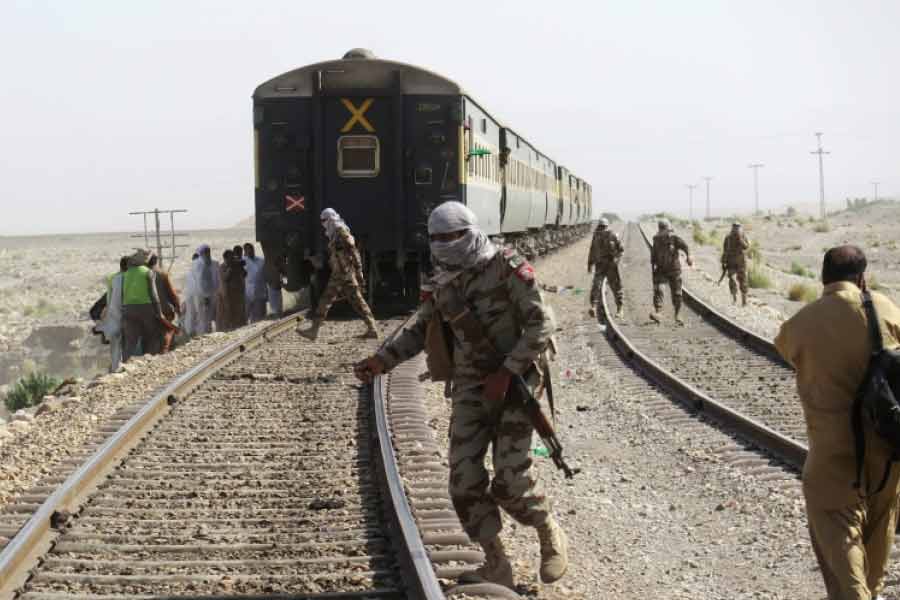Baloch Rebels Hijack Pakistani Train, Hold Hundreds Hostage in a Bold Attack
In a shocking and unprecedented act of violence, militants from the Baloch Liberation Army (BLA) hijacked the Quetta-Peshawar Jaffar Express on Tuesday, taking nearly 450 passengers hostage, including women and children. The attack, which unfolded in Balochistan’s Bolan district, has sent shockwaves across Pakistan, highlighting the worsening separatist conflict in the region.
According to initial reports, the attack was meticulously planned. The BLA claims its fighters planted explosives on the railway tracks near Mashkaf, forcing the train to grind to a halt. Within moments, armed militants stormed the compartments, overpowering security personnel and taking control of the train. The group later released a statement confirming the attack, boasting that they had successfully captured more than 100 Pakistani security personnel traveling on the train.
Eyewitnesses described the scene as chaotic, with gunfire ringing out as the militants took over. A train driver was reportedly injured in the attack, while terrified passengers were forced to the floor as the rebels moved through the carriages, searching for military personnel and officials. The attack prompted an immediate response from security forces, with rescue teams and army units dispatched to the area. However, after more than six hours, the military had yet to secure the release of the hostages, raising fears for their safety.
A Deadly Message: The BLA’s Growing Insurgency Against the State
This attack marks a significant escalation in the decades-long conflict between Baloch separatist groups and the Pakistani government. The BLA, one of the most active militant groups in the region, has long sought independence for Balochistan, accusing Islamabad of exploiting the province’s vast natural resources while neglecting its people. Over the years, the group has carried out numerous deadly attacks targeting security forces, infrastructure, and foreign interests in the region.
The timing of this attack suggests a strategic move by the BLA to further destabilize the region and challenge the authority of the Pakistani military. Analysts believe that by targeting a train carrying both civilians and security personnel, the group is aiming to maximize psychological and political pressure on the government.
Why Are Baloch Separatists Targeting Chinese Investments?
Beyond their conflict with the Pakistani state, Baloch separatists have increasingly turned their attention to Chinese projects in the region. China has invested billions of dollars in Balochistan as part of the China-Pakistan Economic Corridor (CPEC), a massive infrastructure project that includes highways, railways, and energy plants.
However, many Baloch residents view these projects as exploitative, arguing that they benefit only the central government and foreign investors while leaving local communities impoverished and displaced. There have also been allegations that newly installed cellphone towers in the region are being used for surveillance rather than improving connectivity, further fueling local resentment.
In recent years, Baloch militant groups have launched a series of attacks targeting Chinese workers and projects, viewing them as symbols of foreign domination. The Pakistani government has responded by increasing security around Chinese investments, but this latest attack raises serious questions about the effectiveness of those measures.
Military Response: Cobra Helicopters and Fighter Jets Deployed
With tensions escalating rapidly, Pakistan has launched a full-scale military operation to regain control of the hijacked train. Elite security units, along with Cobra helicopters and jet fighters, have been deployed to Dhadar in an attempt to neutralize the militants and rescue the hostages.
However, the BLA has claimed that they successfully repelled an initial ground assault by the Pakistani military, forcing security forces to retreat. The group has also issued a chilling ultimatum, warning that they will begin executing hostages if the military does not halt its operations.
The situation remains highly volatile, with authorities weighing their next steps carefully. A botched rescue attempt could lead to mass casualties, while prolonged negotiations might further embolden the militants.
Intelligence Warnings Ignored?
As the crisis unfolds, disturbing revelations have emerged regarding the Pakistani government’s failure to prevent the attack. Reports indicate that Balochistan’s Counter-Terrorism Department (CTD) had issued a warning just days before the attack, alerting authorities to a potential militant operation targeting railway infrastructure.
A leaked letter, seen by CNN, revealed that security agencies were urged to take “extraordinary precautions” to prevent any possible attack. Yet, despite this forewarning, militants were able to execute their plan with remarkable precision, raising serious concerns about security lapses and intelligence failures.
Train Services Suspended, Fear and Uncertainty Grip the Region
In response to the attack, train services from Quetta have been suspended indefinitely as authorities scramble to repair the damaged tracks and assess the security situation. Railway officials have begun work on restoring the infrastructure, but normal operations are unlikely to resume until the crisis is fully resolved.
Meanwhile, fear and uncertainty have gripped the region. The people of Balochistan, who have lived under the shadow of insurgency for years, now face an even greater threat as militant activity intensifies. Families of the hostages wait anxiously for updates, while the Pakistani government comes under increasing pressure to demonstrate that it can maintain control over its troubled province.
A Nation on Edge: What Happens Next?
As Pakistan struggles to contain the fallout from this attack, the coming hours will be crucial. If the military successfully rescues the hostages, it could deal a major blow to the BLA’s campaign. However, if the crisis drags on—or worse, results in significant civilian casualties—the consequences could be far-reaching, not just for Pakistan but for regional stability as a whole.
For now, all eyes remain on Balochistan, where the balance of power between the state and separatist forces continues to shift with each new attack. The next move—whether military action, negotiations, or a diplomatic intervention—will determine how this high-stakes standoff ultimately plays out.

COMMENTS (0)
Sign in to join the conversation
LOGIN TO COMMENT